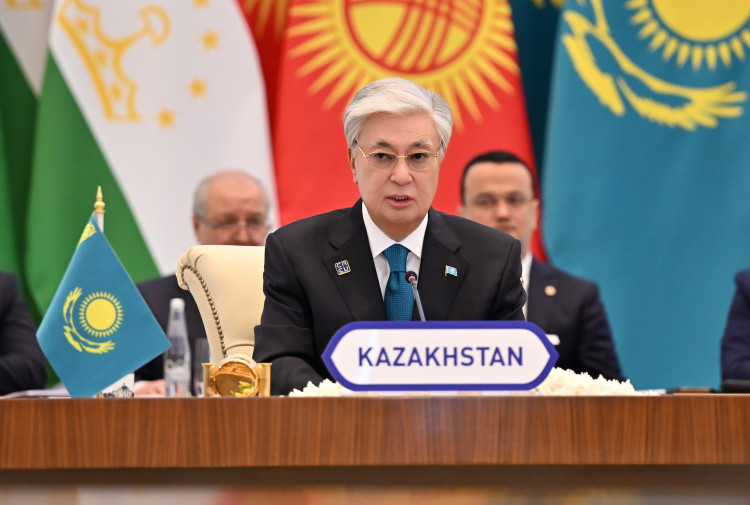ASTANA ( WNAM MONITORING ): President Kassym-Jomart Tokayev shared his vision of a promising agenda for cooperation between Central Asia and the European Union (EU) at the Central Asia-EU Summit on April 4 in Samarkand, Uzbekistan.
Expanding trade
Tokayev expressed Kazakhstan’s readiness to increase exports to the EU across 175 product categories worth over $2 billion. Current exports include wheat, flax seeds, and processed grains, and the next step is aimed at opening EU markets to Kazakh livestock, dairy products, and premium organic food.
This diversification will strengthen Kazakhstan’s role as a reliable and competitive trade partner. Tokayev called on European companies to use the Astana International Financial Centre to finance such projects.
Energy security
Kazakhstan remains a trusted supplier of hydrocarbons to Europe, currently accounting for 13% of the EU’s oil imports, mostly through the Caspian Pipeline Consortium. Tokayev highly appreciated EU’s support in maintaining the long-term stability of this route while developing alternative routes for the transportation of raw materials.
The country is also advancing renewable energy, including wind, solar, and green hydrogen projects with long-standing European partners such as Total, Eni, and Svevind. A joint initiative with Uzbekistan and Azerbaijan is underway to build a green energy transmission line across the Caspian Sea with further access to European markets.
Rare earth elements
Kazakhstan produces 19 of the 34 raw materials the EU economy needs, including uranium, titanium, copper, lithium, cobalt, tungsten, and many others. The country is working with the European Bank for Reconstruction and Development on sustainable mining and exploration.
Tokayev proposed establishing a Regional Research Center for Rare Earth Metals in Astana, which can become a source of up-to-date information for enterprises and investors on available deposits, technologies, and their development.
Transit, decarbonization
Tokayev believes, with the necessary infrastructure, Central Asia can become a prosperous transit hub, ensuring effective supply chains between the East and the West. Kazakhstan is investing heavily in the Trans-Caspian International Transport Route, which offers a reliable alternative to traditional corridors.
Last year, freight traffic via this route increased by 62% to 4.5 million tons. By 2027, the country aims to more than double this to 10 million tons annually. Additionally, Tokayev welcomed the EU’s Global Gateway strategy that prioritizes sustainable transport connectivity in the region.
Kazakhstan also stands at the forefront of decarbonization initiatives. Tokayev said the country plays a key role in producing clean energy, providing about 40% of the world’s nuclear fuel supplies. A Regional Project Office on Climate Change and Green Energy was launched last year in Kazakhstan to coordinate regional initiatives.
Digital technologies and AI
Kazakhstan invests in artificial intelligence (AI) and digital technologies that drive growth and modernization. The newly launched Alem.AI innovation hub in Astana and a dedicated Venture Capital Fund aim to support startup development.
Tokayev proposed establishing an EU-Central Asia Innovation Campus at Astana Hub and announced the launch of an International Advisory Council on AI in January with a goal to train 100,000 skilled IT professionals.
Education and science
Tokayev praised strong cooperation in education with the EU through Erasmus+, Horizon Europe, and other programs. Over 30 international university branches have opened in Kazakhstan, helping to build world-class academic capacity.
“We aim to expand grant and scholarship programs for our students,” the President said, proposing to create an Erasmus+ for Central Asia program, focusing on priority fields such as AI, water management, and biotechnology.
Global security
According to Tokayev, Kazakhstan plays the role of a middle power and a bridge between East and West, maintaining a balanced foreign policy. In times of rising global instability, he urged all nations to uphold the UN Charter and universally recognized principles of international law, and to support the efforts of UN Secretary-General António Guterres.
“Kazakhstan consistently advocates for peaceful resolution of conflicts, therefore we welcome the start of negotiations on Ukraine and hope for a favorable outcome, although we fully understand the complexity of the situation,” he noted.
He thanked the EU and summit participants for backing the creation of the UN Regional Centre for Sustainable Development Goals for Central Asia and Afghanistan in Almaty, which will effectively serve the promotion of the universal Agenda 2030, and contribute to the solution of urgent social, economic, and environmental issues in the region.


